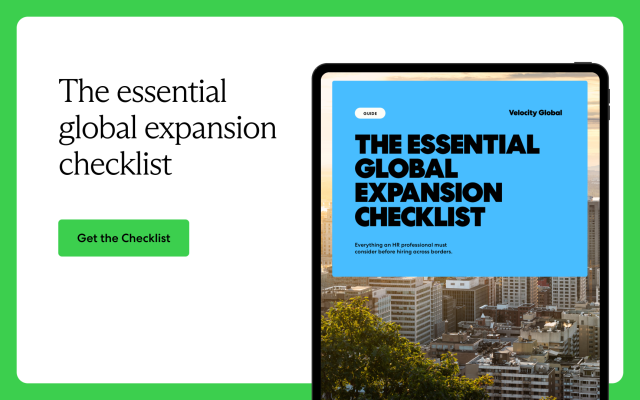Global expansion is an international growth strategy where an organization expands domestic operations to new markets overseas. When done correctly, it opens up a world of opportunity, from accessing a wider talent pool to diversifying revenue streams.
In today’s interconnected world, international expansion is a viable option for any business. Still, going global involves careful planning, such as conducting market research, ensuring regulatory compliance, and adapting your brand image to new cultures.
Read on for a complete breakdown of global expansion, including a concise definition, tips on building a strategic global expansion plan, and a list of the associated benefits and risks. Plus, find out how to expand internationally with ease, no matter your business size.
What is global expansion?
Global expansion is a business growth strategy in which an organization expands its operations into foreign markets. The benefits include cost reduction, risk mitigation, and increased revenue. Today, companies can expand globally by establishing foreign entities, partnering with a global expansion expert, or hiring international contractors.
Despite its benefits, global expansion also involves unique challenges, requiring due diligence to mitigate risk. Difficulties include adapting your brand to new cultures and ensuring regulatory compliance.
For instance, any company that runs production in Germany must also take responsibility for reducing packaging waste by registering with the Central Packaging Register (ZSVR). Failing to register with ZSVR can result in noncompliance penalties of up to €200,000.
Still, with careful planning, global expansion is a powerful growth strategy that offers lucrative opportunities for businesses of all sizes. If you are considering international expansion, booming markets in 2024 include the United Kingdom, United States, Canada, Germany, Sweden, and the Netherlands.
Growing your business abroad? Get our global expansion checklist to learn key tips and insights on how to develop your global expansion strategy, conduct market research, and engage top global talent with compliance.

What is the purpose of global expansion?
Global expansion serves many purposes—by going global, companies can test the limits of their brand and explore their potential customer base. Some companies expand overseas to source new talent and strengthen domestic operations, while others seek to establish strategic international partnerships. The exact reasons businesses expand globally depend on individual circumstances and business goals.
Key benefits of global expansion
As previously mentioned, going global offers businesses numerous benefits, from cost reduction and talent acquisition advantages to increased revenue and risk mitigation.
Below, we provide a comprehensive list of how international expansion can benefit businesses of all sizes.
- Increased market reach. Global expansion gives companies access to new markets and increases their customer base. This is particularly advantageous if your domestic market is over-saturated and offers limited growth potential.
- Diversification of revenue streams. Operating across multiple markets helps mitigate risks associated with economic downturns or market-specific challenges. Diversification stabilizes revenue streams, protecting you from overreliance on a single market.
- Economies of scale. Companies benefit from economies of scale and reduce production, distribution, and procurement costs by operating on a larger scale and reaching a broader customer base.
- Access to talent. Global expansion gives you access to a larger talent pool. Sourcing skilled workers, innovators, and specialists from different regions enhances a company's competitiveness and fosters innovation.
- Enhanced brand recognition. Operating internationally can boost a company's brand recognition and reputation, increasing credibility and consumer trust.
- Risk mitigation. Diversifying across multiple markets makes a business more resilient to changes in government policies, economic conditions, or legal environments in a particular country.
- Strategic alliances and partnerships. Global expansion allows companies to form strategic alliances and partnerships with local businesses. Collaborations with established players can help you navigate cultural nuances and regulatory complexities.
- Access to resources. Companies expanding globally gain access to new resources, such as raw materials, technology, and infrastructure, which contribute to operational efficiency and innovation.
- Learning and adaptation. Operating in diverse markets exposes companies to new business practices, consumer behaviors, and cultural norms. This learning experience leads to greater adaptability, agility, and a deeper understanding of global markets.
- Competitive advantage. Global expansion creates a competitive edge by allowing you to be among the first movers in an emerging market, establishing a strong presence before competitors enter.
Key difficulties of global expansion
Despite its many benefits, global expansion also involves unique challenges. The difficulties businesses face when operating internationally range from navigating cultural differences and assessing political instability to managing a global workforce.
Below, we list the main challenges companies face with global expansion.
- Cultural differences. Variations in languages, customs, and cultural norms can impact communication, marketing strategies, and overall business operations. Companies must adapt their products and services to align with the cultural preferences of each target market.
- Regulatory and legal compliance. Navigating legal and regulatory frameworks across different regions can be challenging. Companies must stay abreast of local laws, licensing requirements, and compliance standards to avoid legal issues and ensure ethical business practices.
- Political instability. Political changes and geopolitical tensions can pose significant risks to global operations. Companies must assess the political stability of their target countries and develop strategies to manage potential disruptions.
- Logistics and supply chain challenges. Managing a global supply chain involves navigating transportation, customs, and distribution complexities. Coordinating logistics and supply chain processes is critical for avoiding delays, disruptions, and added costs.
- Currency exchange risks. Exchange rate fluctuations can impact the cost of goods, pricing strategies, and overall financial performance. Develop an effective currency risk management strategy to mitigate the impacts of exchange rate volatility.
- Market saturation and competition. The level of competition in a foreign market may differ from that in your domestic market. Assess local competitors, market dynamics, and consumer preferences to develop an effective market entry strategy.
- Talent management. Attracting, retaining, and managing a diverse workforce across different cultures and regions can be difficult. Companies need effective human resource strategies to address cultural nuances, language barriers, and talent acquisition challenges.
- Communication barriers. Language differences can lead to miscommunication, misunderstandings, and ineffective collaboration. Invest in clear and culturally sensitive communication strategies to foster effective internal and external communication.
- Technology and infrastructure variances. Differences in technology adoption and infrastructure development can impact your ability to operate efficiently in new markets. Adapting technology solutions to local contexts is essential for success.
- Customer behavior and preferences. Understanding and adapting to local consumer behavior and preferences is critical for product or service success. Conduct thorough market research and tailor your offerings to each customer base’s specific needs.
- Brand adaptation. Building and maintaining a consistent brand image across different cultures can be challenging. You may need to adapt your branding, marketing messages, and promotional strategies to resonate with local audiences.
Learn more: Globalization Benefits and Challenges
How to build a strategic global expansion plan
Global expansion isn’t a default growth option—it’s an investment strategy that requires careful planning. Companies expand globally in different ways, reaping unique benefits and achieving different goals depending on their strategy and target markets.
Creating a strategic global expansion plan involves many steps, from assessing supply chains and logistics to performing risk assessments. Below, we list the key steps all companies should take before entering a foreign market.
- Conduct market research. Assess the global marketplace and identify target markets based on various factors, such as market size and competition.
- Ensure legal and regulatory compliance. Familiarize yourself with the legal and regulatory requirements in each of your target markets. Identify licensing and permitting requirements and seek legal counsel from a local, third-party expert to mitigate risk.
- Conduct financial planning. Assess the financial viability and potential return on investment for each market, taking into account exchange rates and taxes. Budget for initial setup costs, operational expenses, and contingencies.
- Perform a risk assessment. Conduct a thorough risk analysis of your target markets, considering political, economic, legal, and operational factors, and create a contingency plan.
- Assess the supply chain and logistics. Assess the supply chain, considering potential transportation, customs, and distribution challenges. Evaluate logistics partners, identify potential bottlenecks, and utilize technology to optimize supply chain processes.
- Consider cultural adaptation. Assess the cultural landscape across markets and create a strategy for adapting products, services, and marketing messages to local cultures. Train employees on cultural sensitivity and communication skills.
- Establish a talent management strategy. Establish a plan for recruiting, training, and managing a global workforce, accounting for language barriers and differences in HR standards. Consider partnering with a global expansion expert to handle compliant local hiring and onboarding and offer ongoing HR support.
- Integrate technology. Implement technology integrations, such as workforce management platforms, that streamline daily work processes and consolidate global tasks into one workspace. Take measures to comply with local data security regulations and ensure cybersecurity.
- Establish a market entry strategy. Decide on an appropriate market entry strategy, such as a joint venture, partnership, or acquisition. Develop a phased approach for market entry, allowing for adjustments based on market feedback and performance.
- Monitor and evaluate your success. Establish key performance indicators (KPIs) to measure your success as you expand. Continuously monitor and evaluate your progress, remain flexible, and adjust strategies based on market feedback and changing conditions.
- Develop a compliance and ethics program. Develop a comprehensive compliance and ethics program to adhere to global standards like equal opportunity laws, tax compliance, and minimum employee entitlements. This includes fostering a culture of ethical behavior and compliance within the company.
- Ensure sustainability and corporate social responsibility (CSR). Consider the environmental and social impact of your operations in each market. Develop CSR initiatives that align with local expectations and contribute positively to communities.
- Establish local partnerships. Establish relationships with local partners, industry associations, and business networks. Leverage their expertise for market insights and navigating local business environments.
- Prepare an exit strategy. Develop a contingency plan and an exit strategy in case market conditions or your business performance necessitates withdrawal from a particular country.
Global expansion best practices
By adhering to global expansion best practices, organizations can increase their chances of finding success as they enter new markets, ensuring they reap the previously mentioned benefits while mitigating risk.
We discuss the most important practices below to help your team better understand what it takes to expand overseas.
Use an agile approach
Establishing a foreign business entity in your target market is the traditional approach to expanding overseas.
While entity establishment offers unique advantages, such as reduced hiring costs, it’s time-consuming, expensive, and limits flexibility. With this route, it’s nearly impossible to test the waters of a particular market and pivot your approach before investing long-term.
Consider hiring international contractors or partnering with an employer of record (EOR) to remain flexible while expanding overseas.
By hiring international contractors, organizations can forgo entity establishment and source foreign talent with specialized skills for short-term projects. With this approach, you can save time and resources you would otherwise spend on hiring and paying full-time employees.
However, hiring contractors involves misclassification risk and limits your ability to develop a committed, cohesive team that can support long-term growth should you decide to expand further.
The most agile approach to international expansion is to partner with a global expert, such as an EOR. An EOR makes it easy for organizations to quickly and compliantly enter new markets without establishing legal entities or worrying about complying with local tax and labor laws.
Plus, an EOR partner handles all regulatory requirements and complex tasks associated with global expansion. This includes hiring, onboarding, immigration, compliance, running global payroll, and administering global benefits while offering ongoing HR support to your team.
By partnering with an EOR, you can forgo investing in local infrastructure until you’re certain your move will be a success. By taking smaller, flexible steps in international growth, you’ll typically find better results.
Learn more: What Is an Employer of Record (EOR)?
Embrace the culture
Navigating cultural differences between your domestic market and your target markets is critical for finding success as you expand globally.
Consider language, business practices, and cultural norms in each market and determine how they will impact marketing efforts, brand image, inter-organizational communication, and communication with local partners.
Establish a strategy that fosters effective communication. Familiarize yourself with cultural standards and ethical practices to avoid faux pas in business communication and ensure each team member feels comfortable and supported at work.
Due to cultural nuances, countries perceive brand images differently. Study your target market, adjust your brand image to resonate with the local audience, and tailor your product and service offerings to the specific needs of the local customer base.
Consider visiting your target market and familiarizing yourself with local customs and business practices in person. The more immersion, the better. Assessing markets from abroad is necessary for developing an effective global expansion strategy, but first-hand experience with local customs, people, places, and organizations offers invaluable insight.
As you immerse yourself in the local culture and familiarize yourself with its nuances, determine how your organization can adapt to these differences while staying true to your business—this will be critical for ensuring sustainable growth.
Over time, your business will become more agile and develop a deeper understanding of global markets, simplifying any efforts to expand further.
Establish international partnerships
Business relationships are a key ingredient for success in any market. One of the best ways to establish an effective global expansion strategy is to build relationships with trusted local experts in your target markets.
Consider connecting with legal experts, recruiters, HR partners, benefits brokers, and payroll providers. Develop strategic business partnerships with local companies and identify business networks, industry associations, and key events to participate in.
One valuable relationship can lead to numerous others. A single international partner with access to an extensive network of potential customers and employees can help you quickly gain access to the local market when you first establish your presence.
A trusted partner may also be available to develop business opportunities in additional markets, providing valuable assistance if you’re not readily available to travel. Any company that compliments your service or product may offer another way to expand operations within your target market and beyond.
Read also: Top 5 Global Expansion Strategies
Rely on an experienced team
Ensuring compliance, assessing market feedback, and strategically scaling operations while entering new markets can overwhelm HR teams. Partnering with an experienced global expert, such as an EOR, can make a world of difference.
Velocity Global is a market-leading, full-service EOR provider with unmatched scale, in-country expertise, and global workforce solutions. Our EOR solution makes it easy for organizations to expand to over 185 countries without setting up legal entities or worrying about compliance.
We provide support at each step of your expansion, from conducting market research, performing risk assessment, and developing locally-tailored CSR initiatives to assisting with cultural adaptation and offering ongoing HR support.
Whether you’re looking for a quick and secure way to test the waters of a new market or you want to kickstart operations while waiting on entity procedures or banking delays, an experienced partner like Velocity Global can make it happen.
Execute your global expansion strategy with Velocity Global
Contact Velocity Global today to learn how we can help you expand globally with ease.



